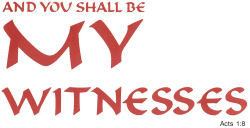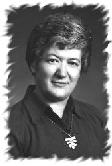

 Vol. 2, No. 1, January, 1997
The Challenge Before Us, Part 1
Vol. 2, No. 1, January, 1997
The Challenge Before Us, Part 1by Sr. Angeline Bukowiecki, S.N.C.
 What I would like to share with you this month are the statistics concerning the dominant culture within the U.S. -- the 177 million Anglo-Americans.
There were two Gallup Surveys of unchurched Americans done, one in 1978 and repeated ten years later in 1988. They give an extensive profile of the similarities and differences between the "churched" and the "unchurched." The underlying purpose of these polls was to improve understanding of the dynamics which move Americans to join churches or to leave them.
The findings confirm, in general, that the U.S. has moved further in the direction of being a nation of spiritual loners, a society of free-lance beievers who accept many of the core truths of Christianity, but feel a lessening attachment to the institutions that have preserved those preserved those beliefs.
There is a growing gap between religious belief and church involvement--a growing gap between "believers" and "belongers." Churches in the U.S., as a whole, have not made any headway since 1978 bringing "believers" into the "community of active worshipers." The results of the poll, gathered from 2,556 adults, eighteen and over, only underscore the obstacles facing the task of evangelization.
From 1978 to 1988, the number of unchurched adults rose from 41 percent to 44 percent. That means that the number of unchurched rose from 61 million to 78 million, out of the 177 million adults, in the latest survey -- 17 million of whom are Catholic. The percentage of "churched" Americans slipped from 59 percent to 56 percent.
There is a growing similarity between the "churched" and the "unchurched." For example, 53 percent of the churched and 62 percent of the unchurched think it doesn't matter what Church a person attends, because "one church is as good as another." Both groups manifest a relatively similar set of beliefs and highly agree that those beliefs can be held and nurtured in private apart from any organized religious group. This is not the Catholic tradition which is richly grounded in a deep sense of "belonging."
Those reaching out to the unchurched need to realize that alienated/inactive Catholics and potential Catholics are going to be very selective about "where" and under "what" conditions they will become churched. This same survey indicates that the most effective means of bringing people into a church community is through personal invitation. However, invitation and evangelization are virtually ignored by the "mainline" churches. Thirty-eight percent of the unchurched and 31 percent of the churched said they had been approached during the previous months. And 79 percent of these had been approached more than once. None of these had been approached by a Catholic. By far, most of these approaches are made by Fundamentalist and Pentecostal groups. Most of these approaches were personal invitations made by acquaintances. What effect did these invitations have upon those approached? Thirty-six percent of the unchurched and 29 percent of the churched had a favorable response.
Interfaith marriages are the single largest source of converts to Catholicism, but it is also the largest impetus for leaving the Catholic Church. Over 40 percent of all marriages are interfaith marriages. The less committed spouse converts to the church of the more committed spouse.
Only 12 percent of new adult Catholics come as "seekers." These come to the Catholic Church in search of an answer to a spiritual need or a sense of void or meaninglessness. Of the fifty-three million active Catholics in the U.S., it is estimated that no more than one million, or only about 2 percent of today's Catholics, look for opportunities to witness what Jesus Christ has done in their lives and invite others to investigate the Catholic Church.
These statistics, which I believe are still true today, give us some idea of the forces at work which put the evangelistic outreach of the Church in the U.S. under intense stress, save for trusting in the lead of the Holy Spirit.
Can we evangelize the masses to new forms of authentic belonging, and create a powerful "community" alternative, a true counterculture? To do so, it will be necessary to identify key issues in the Church's own life and mission needing attention. For example, at the local level:
What I would like to share with you this month are the statistics concerning the dominant culture within the U.S. -- the 177 million Anglo-Americans.
There were two Gallup Surveys of unchurched Americans done, one in 1978 and repeated ten years later in 1988. They give an extensive profile of the similarities and differences between the "churched" and the "unchurched." The underlying purpose of these polls was to improve understanding of the dynamics which move Americans to join churches or to leave them.
The findings confirm, in general, that the U.S. has moved further in the direction of being a nation of spiritual loners, a society of free-lance beievers who accept many of the core truths of Christianity, but feel a lessening attachment to the institutions that have preserved those preserved those beliefs.
There is a growing gap between religious belief and church involvement--a growing gap between "believers" and "belongers." Churches in the U.S., as a whole, have not made any headway since 1978 bringing "believers" into the "community of active worshipers." The results of the poll, gathered from 2,556 adults, eighteen and over, only underscore the obstacles facing the task of evangelization.
From 1978 to 1988, the number of unchurched adults rose from 41 percent to 44 percent. That means that the number of unchurched rose from 61 million to 78 million, out of the 177 million adults, in the latest survey -- 17 million of whom are Catholic. The percentage of "churched" Americans slipped from 59 percent to 56 percent.
There is a growing similarity between the "churched" and the "unchurched." For example, 53 percent of the churched and 62 percent of the unchurched think it doesn't matter what Church a person attends, because "one church is as good as another." Both groups manifest a relatively similar set of beliefs and highly agree that those beliefs can be held and nurtured in private apart from any organized religious group. This is not the Catholic tradition which is richly grounded in a deep sense of "belonging."
Those reaching out to the unchurched need to realize that alienated/inactive Catholics and potential Catholics are going to be very selective about "where" and under "what" conditions they will become churched. This same survey indicates that the most effective means of bringing people into a church community is through personal invitation. However, invitation and evangelization are virtually ignored by the "mainline" churches. Thirty-eight percent of the unchurched and 31 percent of the churched said they had been approached during the previous months. And 79 percent of these had been approached more than once. None of these had been approached by a Catholic. By far, most of these approaches are made by Fundamentalist and Pentecostal groups. Most of these approaches were personal invitations made by acquaintances. What effect did these invitations have upon those approached? Thirty-six percent of the unchurched and 29 percent of the churched had a favorable response.
Interfaith marriages are the single largest source of converts to Catholicism, but it is also the largest impetus for leaving the Catholic Church. Over 40 percent of all marriages are interfaith marriages. The less committed spouse converts to the church of the more committed spouse.
Only 12 percent of new adult Catholics come as "seekers." These come to the Catholic Church in search of an answer to a spiritual need or a sense of void or meaninglessness. Of the fifty-three million active Catholics in the U.S., it is estimated that no more than one million, or only about 2 percent of today's Catholics, look for opportunities to witness what Jesus Christ has done in their lives and invite others to investigate the Catholic Church.
These statistics, which I believe are still true today, give us some idea of the forces at work which put the evangelistic outreach of the Church in the U.S. under intense stress, save for trusting in the lead of the Holy Spirit.
Can we evangelize the masses to new forms of authentic belonging, and create a powerful "community" alternative, a true counterculture? To do so, it will be necessary to identify key issues in the Church's own life and mission needing attention. For example, at the local level:
- What is attractive about this community that anyone would want to join it?
- Does genuine community exist here? Is there real love and concern?
- Is there an enthusiasm for the Gospel?
- Is there vitality or deadness?